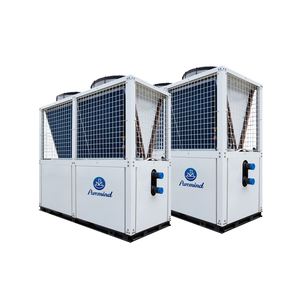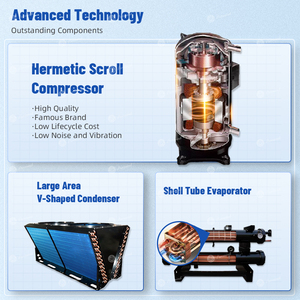(724 products available)





































































































































































































A modular type chiller is a cooling device that typically employs a vapor-compression cycle to extract heat from a liquid. It is designed to be taken apart into smaller, more manageable modules or parts. The following are some of the modular chillers on the market.
Modular air coolers
Modular air cooler chillers use ambient air to dissipate heat via an external radiator or condenser. This is done by a fan or blower that passes the warm refrigerant. Modular air cooler chillers are basically practical and straightforward to install. However, they are temperature-sensitive since their performance fluctuates with the changing environmental temperatures.
Modular water coolers
They normally use water or a specially formulated coolant to absorb heat from the condensers. This allows them to reject heat through the cooling tower. Modular water cooler chiller systems are less temperature-sensitive than air coolers. However, they require a constant supply of water and efficient water management systems.
Modular precision coolers
They are designed to provide accurate temperature control for sensitive applications like data centers, electronic manufacturing, and laboratories. These modular chillers offer high levels of efficiency and stability. They also have features that allow users to set precise temperature and humidity levels. The precise modular chillers can be easily integrated into existing HVAC systems.
Modular glycol chillers
Modular glycol chillers utilize a glycol-water mixture as a refrigerant in applications such as food and beverage processing, industrial cooling, and plastic injection molding. Modular chillers are versatile and can be easily scaled up or down to fit specific cooling demands. They can also be combined with other cooling technologies like evaporative cooling or heat recovery systems.
Flexibility:
Modular chillers are designed to be flexible. Depending on cooling needs and climate conditions, buyers can select additional modules, change the size of existing ones, or modify them to enhance performance.
Maintenance:
Apart from guaranteeing dependability, carefully planned upkeep aids in addressing potential problems early and avoiding significant system failures. Regular examinations, including behavioral research, are advised. In addition, it is essential to pay attention to the equipment's exterior and promptly clean any dirt.
Quality:
Several factors influence how well a modular chiller types, including the modulation of the compressor, the design of the coils and fans, the optimal replication of heat exchangers, the effectiveness of the insulated piping network, and the fine-tuning of the chilled water control system. These elements must always feature robust quality to guarantee a lasting fit, like a shoe.
Efficient:
Modular chillers offer a lot of energy efficiency because they can change their cooling capacity to match the load, minimizing part-load losses. Moreover, advanced variable speed fan and pump technologies, high-performance heat exchangers, and intelligent controls contribute to optimal energy utilization, reducing the environmental impact.
Safe:
Multi-modular cooling systems are safe because their redundancy prevents failures, and the failure of one module improves overall safety. Other characteristics include being flame-resistant, explosion-proof, waterproof, and leak-proof. Additionally, they are very safe for use in various environments because they can detect and avoid challenges like overcurrent, undervoltage, and over-temperature, including other solutions, filter-out strength, and intelligent health checks, safety knowledge detection, and timely accident prevention teaching and practice.
HVAC systems in large commercial buildings:
Modular chillers are used for centralized cooling to maintain comfortable indoor temperatures and manage humidity levels. Their ability to handle high cooling loads and scale to meet demand makes them suitable for this application.
Industrial process cooling:
The modular chiller machine is used to cool down manufacturing equipment, control the temperature of chemical processes, and cool down product molds and cutting tools. The precise temperature control and consistent cooling capacity it provides helps improve product quality and operational efficiency.
Data center cooling:
Modular chillers are employed to remove excess heat from servers and other IT equipment to ensure optimal operation and avoid overheating. Their efficiency and ability to be easily expanded make them excellent for cooling applications in the industry.
Refrigeration in the food and beverage industry:
Modular coolers chillers are utilized to maintain refrigeration systems at a constant temperature for cold storage facilities, food processing plants, and breweries. They provide a steady and dependable source of cooling to protect products' quality and safety.
Hospital and healthcare facility cooling:
Modular type chillers are used to maintain a comfortable environment for patients, visitors, and staff, as well as to cool critical equipment such as MRI machines, CT scanners, and other medical devices. Their reliable and efficient cooling helps support the smooth operation of healthcare facilities and the well-being of patients.
When selecting a modular type chiller for an application, buyers should look into various things to ensure the chillers will fulfill the needs of their specific applications. They should assess the cooling capacity of the modular chillers. They should determine whether the proper chillers will meet their application's cooling demands.
More and more chillers use intelligent control systems to monitor and manage their performance. That includes remote monitoring and ability integration with-building management systems. Such features enhance operational efficiency, hence making them an ideal choice for buyers to stock up and sell. Buyers should also look for a modular chiller with an intelligent control system to optimize its energy usage and performance.
Flexible modular expansion is a key advantage of modular chiller systems. Buyers can look for chillers that offer modular expansion to cater to their future cooling needs. Additionally, buyers can find chillers designed for easy maintenance and service. Modular chillers with service-friendly designs can help end users save time and costly downtime.
When purchasing chillers in bulk, buyers can negotiate volume discounts with the suppliers. They should discuss pricing options with the suppliers to ensure a worthwhile investment for their customers. If buying at retail, they should consider the chillers' compatibility with other refrigeration or cooling system components. To ensure seamless integration, buyers should ensure that the modular chillers they choose will fit and work with existing equipment.
Q1: What is the difference between modular and centralized chillers?
A1: Centralized chiller systems provide cooling from a single central location. On the other hand, modular chiller systems have multiple smaller units spread across different locations.
Q2: What types of refrigerants are used in modular chillers?
A2: The main refrigerant used in modular chillers is R134a, which is commonly known for its effective heat transfer properties.
Q3: Are modular chillers suitable for industrial applications?
A3: Yes, businesses often use modular chillers in industrial settings such as food processing, chemical manufacturing, and plastics.
Q4: How do businesses determine the right size of a modular chiller?
A4: Businesses can perform a detailed load calculation analysis to determine the amount of cooling required. They should consider factors such as building size, insulation, internal heat generation, and desired temperature.